52-Year-Old Adopts Cats Believing That They Are Low Maintenance But Calls Her Estranged Kids Irresponsible For Refusing To Take Care Of Them While She's Away
The popular opinion online is that cats are more low maintenance than dogs. On the surface, that may seem true, but cats do need their owners' care and attention just as much as dogs do.
Cats are generally aloof and may act disinterested at times, but that doesn't mean they can be left alone willy-nilly. Just like dogs, cats depend on their humans as well.
Their needs may look different from those of their canine counterparts, but they must be met nonetheless. People who think that the responsibilities of a cat owner end at replacing their litter shouldn't be allowed to have the companionship of our planet's perfect little killing machines.
One would expect a 52-year-old to know better, but in this case, she obviously didn't. She adopted two cats with the belief that they don't need humans to take care of them.
She claimed that cats are independent creatures and that they don't even need vaccines to protect them. She also feeds them human food, which she thinks provides enough nutrition for them.
One of her kids complained on Reddit about their mom's neglect of the cats. She technically doesn't even have a home and lives at her workplace, as far as her child is concerned.
The problem is that the mom expects her estranged kids to take care of her cats when she's away on business. OP and their sister are already taking care of two elderly dogs since their mom and dad can't be bothered to share the responsibilities.
The mom never consulted OP before adopting the cats but she wants them to carry the burden with her

When her male cat had a UTI while she was away, OP and their sister had no choice but to bring it to the vet
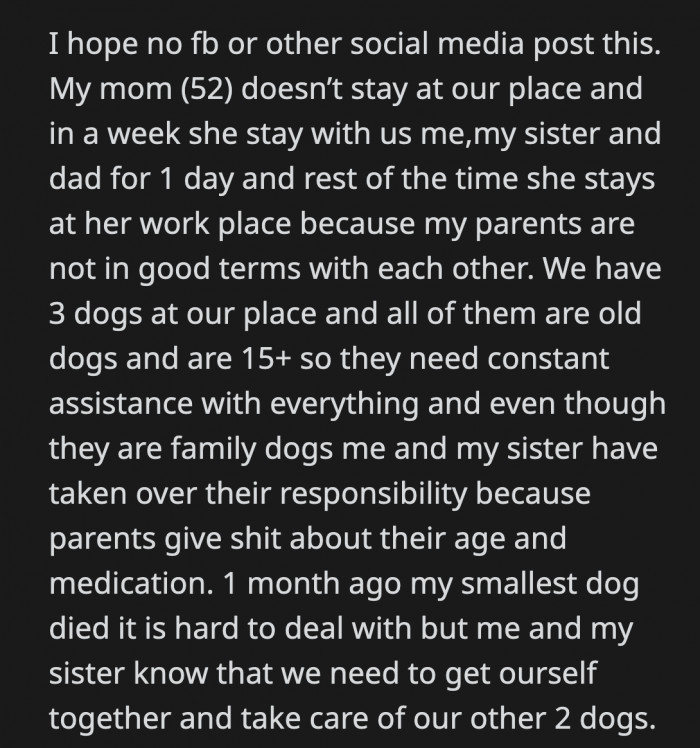
They had to go to their mom's place daily to administer the cat's medicine and then go home to take care of their two elderly dogs
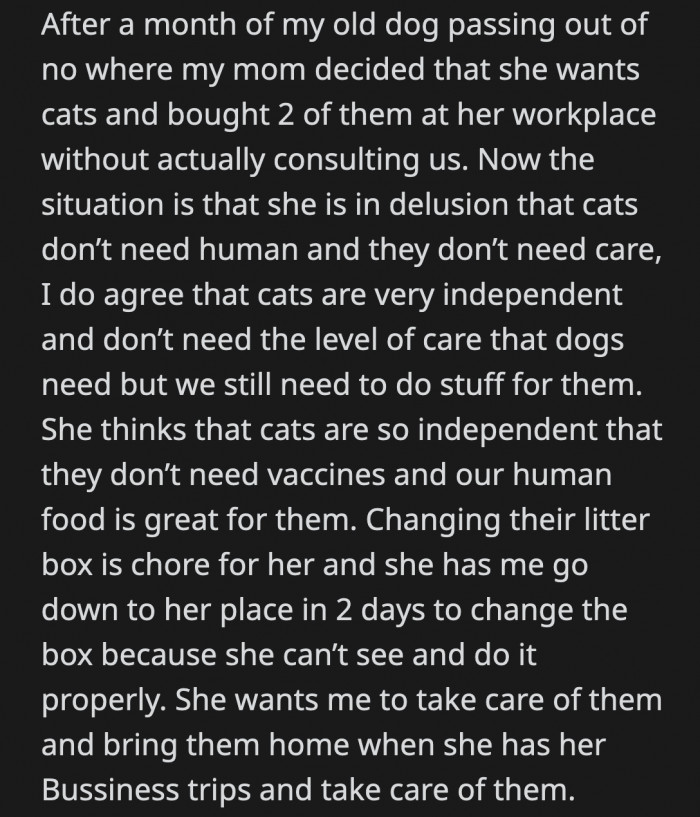
Exploring Responsibility in Adult Relationships
Dr. Rachel Adams, a social psychologist from the University of Michigan, notes that taking on responsibilities such as pet ownership can reveal deeper relational dynamics.
When someone adopts pets believing they are low maintenance, it can reflect unrealistic expectations about caregiving.
This often stems from a lack of experience or an idealized view of what pet ownership entails, which can lead to resentment when reality sets in.
The Psychology of Pet Ownership and Responsibility
The decision to adopt pets often comes with assumptions about their care and maintenance. Research in animal behavior and welfare indicates that owning pets can significantly impact emotional well-being, but it also requires a commitment that some may underestimate. According to Gretchen Rubin, happiness researcher and author, "The emotional bond between humans and pets can enhance our happiness, but it also comes with responsibilities that shouldn't be taken lightly." Furthermore, Dr. Dan Siegel, a child psychiatrist, emphasizes that "pet ownership can be a wonderful experience, but it requires a level of dedication that can be challenging, especially for those already managing family obligations." This highlights the importance of understanding the full scope of responsibilities involved in pet adoption.
OP is getting burnt out from all the responsibilities and told their mom how they felt. OP's mom called them an a**hole for not stepping up when she needed them the most, but OP is drained. Were they wrong?
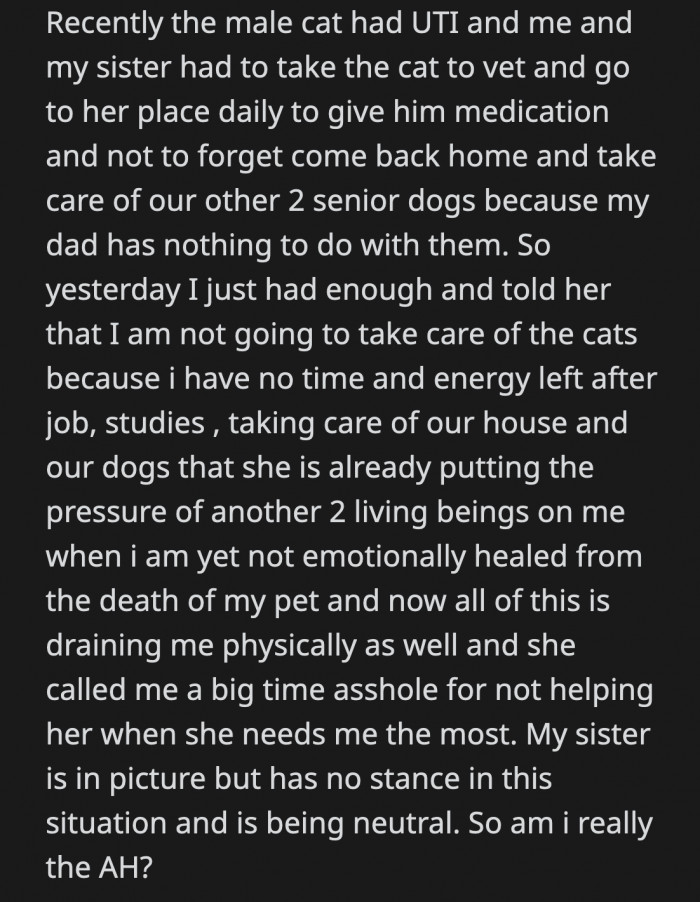
OP has to stop engaging with their mom's attempts to guilt them into taking care of the cats
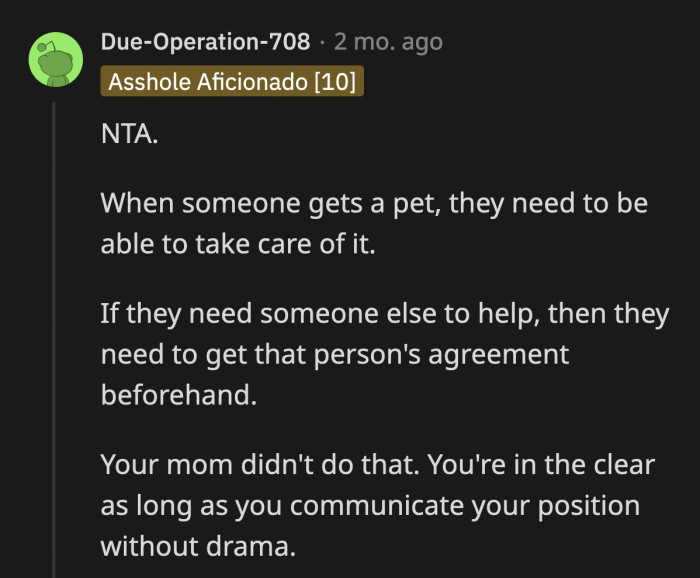
Or they can call Animal Control to rescue the cats from what is sure to be a poor environment for them to live in
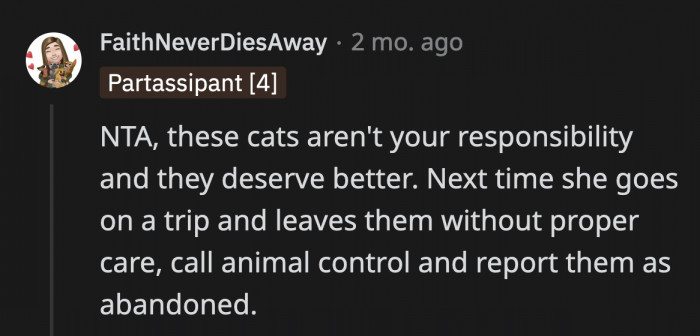
Behavioral studies indicate that individuals who fail to recognize the responsibilities of pet ownership may struggle with accountability in other areas of their lives.
This disconnect can lead to feelings of frustration not only for the pet owner but also for family members who are expected to step in.
Such patterns often reflect broader issues with responsibility and commitment in adult relationships.
Moreover, the disparity between the woman's expectations and her children's willingness to help may reflect broader issues of family dynamics and responsibilities. A family therapist suggests that clear communication about expectations can prevent misunderstandings and foster cooperation.
Research shows that when family members understand their roles and responsibilities clearly, it can enhance family cohesion and reduce conflict.
Unfortunately, OP's country doesn't have an Animal Control department, and OP also doesn't want to just abandon the cats out on the streets

They can try a rescue organization that rescues cats and rehomes them with caring owners who would actually take care of them
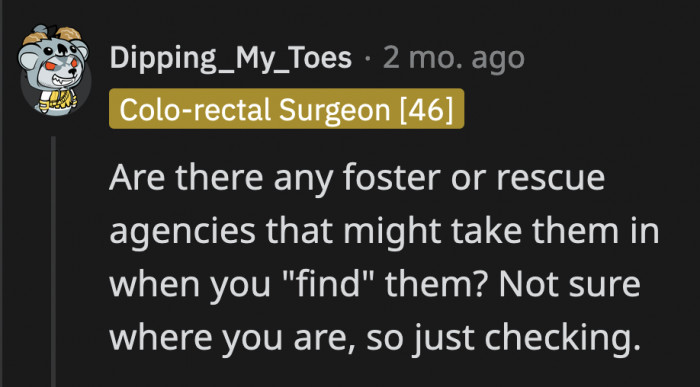
OP said the only rescue they know of is not fully equipped to take care of the specialized needs of some cats, which is important for one of the sickly cats
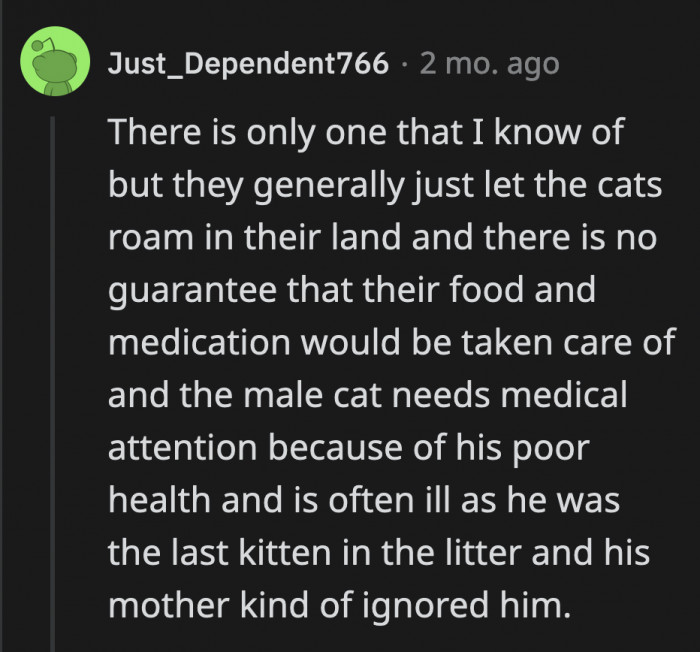
Addressing Unrealistic Expectations
To mitigate these issues, it's vital for individuals to engage in realistic discussions about what pet ownership truly involves.
Setting up a clear plan for care while the owner is away can help establish accountability and shared responsibility.
Experts recommend creating a schedule that outlines who will take care of the pets, ensuring everyone understands their roles and expectations.
The Role of Empathy in Family Relationships
Empathy plays a crucial role in how families navigate responsibilities and emotional needs. When parents fail to recognize their children's perspectives, it can lead to feelings of resentment and inadequacy.
Studies indicate that cultivating empathy within families can enhance emotional connections and reduce conflict, as family members feel heard and valued.
"No" is a full sentence, and OP better practice it when it comes to conversing with their mom
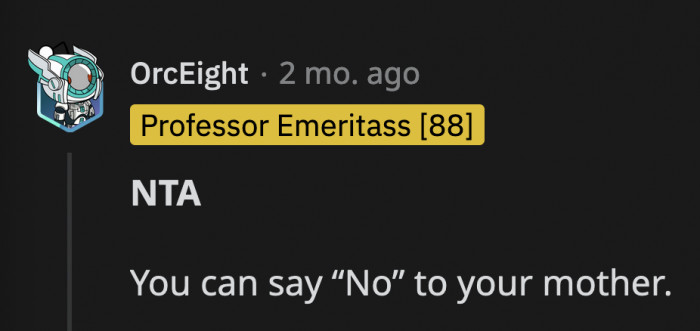
The best thing to do is to really remove the cats from the mom's "care" because she is fully neglecting those cats, and no animal deserves that
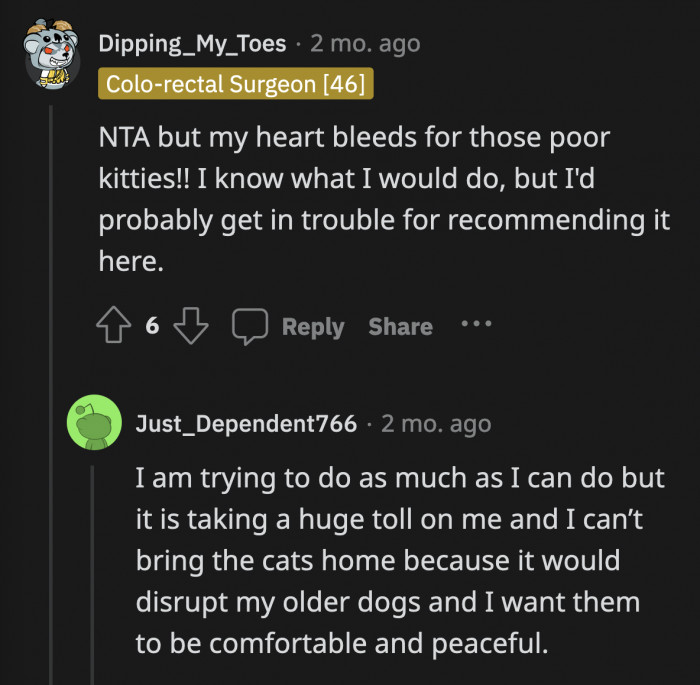
Even if OP had no other responsibilities, they still wouldn't be responsible for the cats their mom adopted
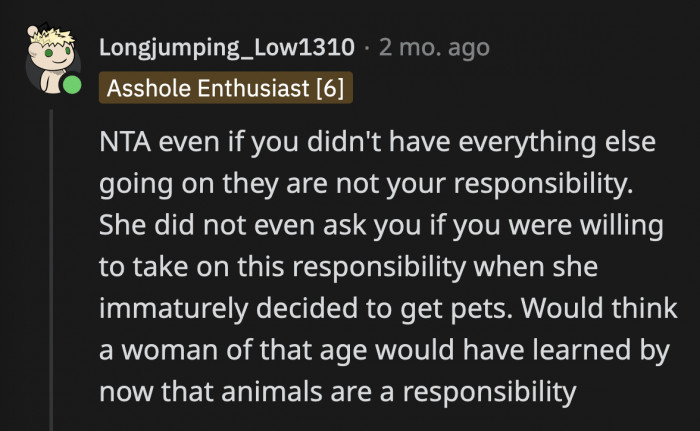
Additionally, considering the emotional needs of both the pet and the family is crucial.
Research indicates that involving family members in the pet care process can help everyone feel more connected and responsible.
When everyone shares the load, it fosters a sense of teamwork and mutual respect.
To improve the situation, the woman could initiate a family meeting to discuss the responsibilities associated with pet ownership. Encouraging children to express their feelings about caring for the cats can help foster a sense of shared responsibility and collaboration.
Additionally, exploring resources on effective pet care and training could help the family better manage their new responsibilities, ensuring that everyone is on the same page.
A person that age should know better instead of pawning off their responsibilities onto their kids. Based on the mom's hands-off attitude toward her own children, her treatment of the cats is not that surprising.
OP hasn't posted any updates regarding the cats' current situation, but they can rest easy knowing that they didn't do anything wrong. The siblings have done what they can for their mom's cats, and it's time for them to focus and devote as much time to their own elderly pets.
Ultimately, understanding and addressing the challenges of pet ownership requires a cooperative approach. Families that work together to establish routines and responsibilities often experience greater satisfaction and reduced conflict.
Research supports that collaborative problem-solving enhances family dynamics, leading to a more harmonious living environment.
Psychological Analysis
This situation illustrates the common challenges families face when adopting pets without fully understanding the associated responsibilities. It's essential for family members to engage in open conversations about their feelings and expectations to foster cooperation. Developing a shared approach to pet care can alleviate tension and promote a sense of teamwork within the family.
Analysis generated by AI
Analysis & Alternative Approaches
In conclusion, the complexities of pet ownership within family dynamics highlight the need for clear communication and empathy. Research consistently shows that when family members engage in open discussions about expectations and responsibilities, it fosters a more supportive environment.
By prioritizing these elements, families can successfully navigate the challenges of pet ownership and enhance their emotional well-being.
Analysis & Alternative Approaches
In conclusion, addressing the responsibilities tied to pet ownership requires openness and clear communication.
As noted by Dr. John Gottman, a renowned marriage researcher, "Effective communication is the cornerstone of any relationship, including those with our pets." Realistic expectations can lead to more fulfilling relationships and healthier family dynamics, as emphasized by Gretchen Rubin, a happiness researcher who states, "Understanding the true nature of our commitments can enhance our overall well-being."



